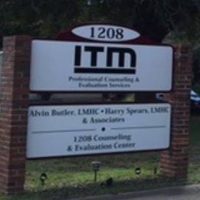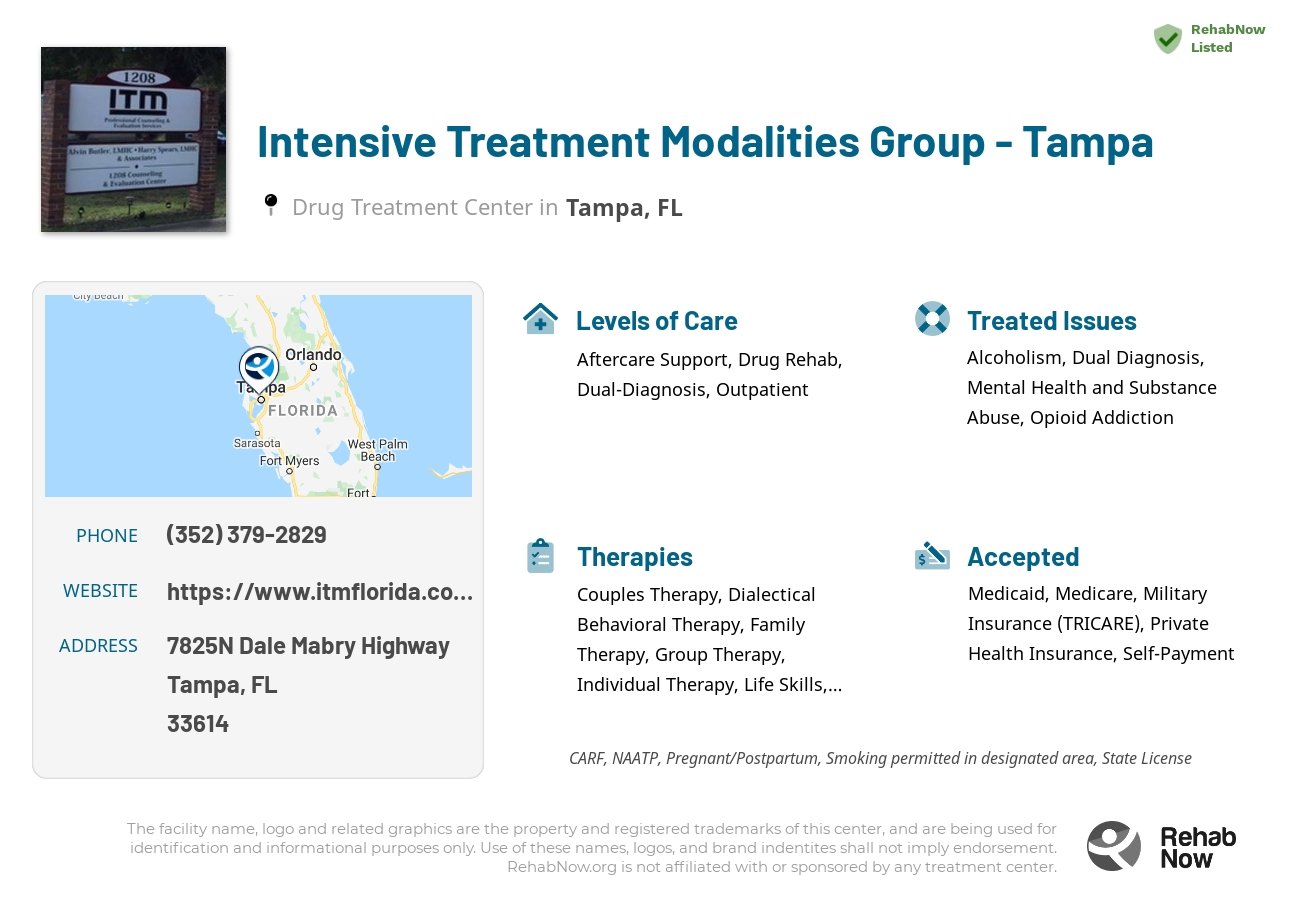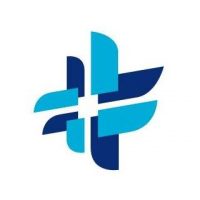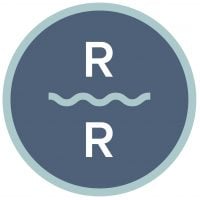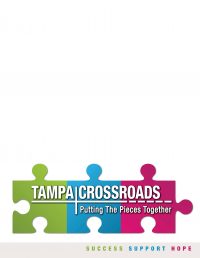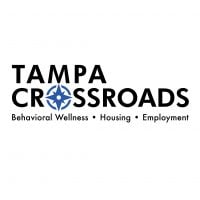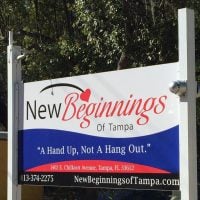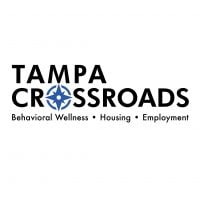Intensive Treatment Modalities Group - Tampa
Drug Rehab Center in Tampa, Florida
Intensive Treatment Modalities Group - Tampa offers evidence-based treatments, such as couple's therapy, dialectical behavioral therapy (DBT), family therapy and cognitive behavioral treatment (CBT) that are tailored to each individual’s needs, to treat substance abuse, mental health concerns and dual diagnosis.
About Intensive Treatment Modalities Group - Tampa in Florida
Intensive Treatment Modalities Group – Tampa is a leading provider in the treatment of substance abuse, mental health concerns, and dual diagnosis. They offer a full spectrum of evidence based treatments for their clients, including couple’s therapy, dialectical behavioral therapy (DBT), family therapy, group therapy, individual therapy, life skills, and motivational interviewing for both aftercare support and drug rehabilitation. Additionally, they provide cognitive behavioral treatment (CBT) that is tailored to each individual’s needs.
Intensive Treatment Modalities Group – Tampa values the well-being of their clients and they are willing to accept private health insurance. They also specialize in treating addiction to opioids, alcohol abuse, and dual-diagnosis which is the presence of both mental health and substance abuse disorders. With years of experience in providing confidential and supportive services, their team of expert professionals is dedicated to helping their clients get the help they need to overcome these struggles and lead more positive and fulfilling lives.
Genders
Ages
Modality
Additional
Conditions and Issues Treated
Opioid addiction starts when a person becomes addicted to legal or illegal opioids. The addiction can happen quickly, in just a matter of days. Opioid withdrawal can be extremely uncomfortable and lead the user to continue to use even if they want to quit. Stopping using an opioid requires medical observation. Sometimes inpatient treatment with a medically supervised detox is necessary for managing the withdrawal process while learning lasting tools for maintaining recovery. Medications may be used in some cases of opioid addiction.
Opioid addiction is one of Florida‘s most prominent forms of addiction. It’s treated by detoxifying the body so that the chemicals from the medications no longer impact them and by therapies to correct behavior and target the root of the problem.
Recovery is not simply about stopping drug use. Recovery is working with addiction while recovering mental health issues that are fueling the addiction in the first place.
Levels of Care Offered
This center offers a variety of custom treatment tailored to individual recovery. Currently available are Aftercare Support, Drug Rehab, Dual-Diagnosis, Outpatient, with additional therapies available as listed below.
Outpatient treatment is considered the lower intensity level of addiction treatment. It’s ideal for early phase addiction or lower intensity addictions. It may include weekly sessions instead of daily. It may include weekly sessions instead of daily. Peer group support, 12-step programs, and individual counseling may still be involved but at a lesser frequency than an intensive outpatient program. It is a good choice for someone who doesn’t need to go through a medically supervised detox and who has a supportive home environment. It requires motivation and dedication to commit to the program without constant monitoring.
Aftercare support should take place after outpatient treatment has ended. There are a few different types of aftercare support that patients can seek. These include 12 Step, Self-help groups (AA, NA), Therapeutic communities, Long-term, structured sober living arrangements, and Halfway houses (residential treatment centers).
Therapies & Programs
Individual therapy involves one-on-one sessions between the patient and therapist. It provides patients with a safe environment to openly discuss personal and sensitive issues with the therapist. They find the therapist as someone they can trust. Individual therapy aims to identify the core issues that would have led the patient to substance abuse and address them effectively. The therapist can develop patient-specific customized solutions through individual therapy, which aids speedier recovery.
Couples therapy works with clients and significant others in a professional capacity to improve relationship dynamics. This can be helpful for addicts who are trying to marry the idea of recovery into their work, family, social lives – any aspect that has to do with relationships.
Through counseling sessions, addicts will have an opportunity to talk about their addiction with professional partners. These partners can offer feedback and advice on how to get sober while keeping healthy relationships intact. A good couples therapist will help addicts understand their part in an unhealthy relationship dynamic or find ways to deal with anger or resentment from significant others outside of the home.
Family therapy is a group problem-solving that aims to improve communication and relationships between the addict, their family, and sometimes friends. The main goal of family therapy for drug addiction is to create an environment where communication can occur without judgment, hostility, or blame. The therapist is with the family as they learn to communicate differently, especially with the addict when s/he is using. The family can learn to reduce their enabling behavior or rally together and support each other during tough times.
An addict’s family can play a vital part in helping them to avoid relapse because they can spot the warning signs and help them get back on track before it becomes too much of a problem. Family therapy is one of the most effective ways to help addicts stay on the path to long-term sobriety. When a drug addict decides that they want to try and get sober, it takes the support of every person they love to succeed. It can be incredibly difficult for loved ones to watch an addict go through the pain and suffering of withdrawal, but by being there with them and supporting them, they can help to make sure that the addiction never returns.
Groups typically involve meetings with other recovering addicts who can relate to one another’s experiences. They might meet in person or online and typically focus on the process of staying sober rather than overcoming a specific addiction.
In these groups managed by Intensive Treatment Modalities Group - Tampa, addicts can build a sense of community and develop strong emotional connections with others who understand what they are going through. These beneficial relationships can help addicts overcome their cravings and prevent relapse at any point during the recovery process.
Dialectical Behavior Therapy (DBT) is a type of therapy created in the late 1980s and early 1990s to help people with high rates of suicidal behavior. DBT helps people learn how to live a life that is no longer controlled by overwhelming emotions and urges. It is beneficial in treating drug addiction because it helps patients understand and cope with their cravings for drugs or alcohol rather than turning to those substances as a way of coping.
There is hope for people who are addicted to drugs and alcohol. Cognitive Behavioral Therapy (CBT) is the solution. CBT focuses on the underlying thoughts and behaviors that caused the addiction problem in the first place and may cause a relapse. This type of psychotherapy addresses negative feelings common in substance abuse disorders. It helps to change them by restructuring thought patterns. It’s about removing negative thoughts and providing long-term benefits while promoting self-awareness, self-control, and healthy ways to respond to negative thoughts. These sessions can be done by themselves or as part of combination therapy.
Since addiction is a chronic physical and mental illness, addicts need to learn as many life skills as possible. Many drug treatment centers offer life skills activities as part of their addiction recovery programs. Examples include cooking classes, employment training, resume writing seminars, parenting classes, and computer training. Life skills activities help addicts find employment, take care of their families, and give back to the community.
Payment Options Accepted
For specific insurance or payment methods please contact us.
Is your insurance accepted?
Ask an expert, call (888) 674-0062
Intensive Treatment Modalities Group Associated Centers
Discover treatment facilities under the same provider.
- Intensive Treatment Modalities Group - Pinellas Park in Pinellas Park, FL
- Intensive Treatment Modalities Group - Orlando in Orlando, FL
- Intensive Treatment Modalities Group - Palatka in Palatka, FL
- Intensive Treatment Modalities Group - Saint Augustine in Saint Augustine, FL
- Intensive Treatment Modalities Group - Starke in Starke, FL
Learn More About Intensive Treatment Modalities Group Centers
Additional Details
Specifics, location, and helpful extra information.
Tampa, Florida 33614 Phone Number(352) 379-2829 Meta DetailsUpdated November 25, 2023
Staff Verified
Intensive Treatment Modalities Group - Tampa Patient Reviews
There are no reviews yet. Be the first one to write one.
Tampa, Florida Addiction Information
Florida is one of the nation's epicenters for substance abuse and drug-related overdoses. In 2014, around 410,000 Florida residents were addicted to drugs and alcohol. Over the last 10 years, 12% of all deaths in the state were attributed to substance abuse. Treatment admissions for alcohol reached 24,329 patients in 2016, and 2.5% of Florida high school students admitted to using crack cocaine.
Tampa, Florida has a serious problem with drug addiction and abuse. The city is one of the top 25 most dangerous cities in America for drug abuse. The most commonly reported primary drugs of abuse were heroin (25.4%), alcohol (24%), cocaine (17.9%), and marijuana (13%). There are various treatment options available for those struggling with addiction in Tampa, Florida. These include inpatient and outpatient treatment, 12-step programs, and therapy.
Treatment in Nearby Cities
- Belleview, FL (76.4 mi.)
- Jacksonville, FL (167.9 mi.)
- Jupiter, FL (165.7 mi.)
- Davie, FL (193.0 mi.)
- Yulee, FL (188.6 mi.)
Centers near Intensive Treatment Modalities Group - Tampa
The facility name, logo and brand are the property and registered trademarks of Intensive Treatment Modalities Group - Tampa, and are being used for identification and informational purposes only. Use of these names, logos and brands shall not imply endorsement. RehabNow.org is not affiliated with or sponsored by Intensive Treatment Modalities Group - Tampa.
